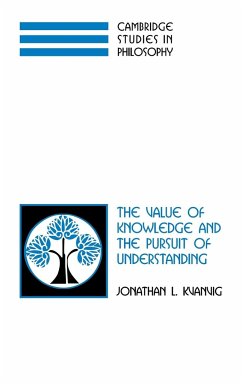Short description/annotation
A philosophical study on the value of knowledge.
Main description
Epistemology has for a long time focused on the concept of knowledge and tried to answer questions such as whether knowledge is possible and how much of it there is. Missing from this inquiry, however, is a discussion on the value of knowledge. In The Pursuit of Knowledge and the Value of Understanding Jonathan Kvanvig argues that epistemology properly conceived cannot ignore the question of the value of knowledge. He also questions one of the most fundamental assumptions in epistemology, namely that knowledge is always more valuable than the value of its subparts. Taking Platos' Meno as a starting point of his discussion, Kvanvig tackles the different arguments about the value of knowledge and comes to the conclusion that knowledge is less valuable than generally assumed. Clearly written and well argued, the book will appeal to students and professionals in epistemology.
Table of contents:
Introduction; 1. The value of knowledge is external to it; 2. The value of true belief; 3. The value of justification; 4. Reliabilism, normativity, and the special promise of virtue; 5. The Gettier problem and the value of knowledge; 6. Knowledge as irreducibly valuable; 7. Epistemic attitudinalism: Semantic and pragmatic approaches; 8. Knowledge and understanding; 10. Conclusion.
Hinweis: Dieser Artikel kann nur an eine deutsche Lieferadresse ausgeliefert werden.
A philosophical study on the value of knowledge.
Main description
Epistemology has for a long time focused on the concept of knowledge and tried to answer questions such as whether knowledge is possible and how much of it there is. Missing from this inquiry, however, is a discussion on the value of knowledge. In The Pursuit of Knowledge and the Value of Understanding Jonathan Kvanvig argues that epistemology properly conceived cannot ignore the question of the value of knowledge. He also questions one of the most fundamental assumptions in epistemology, namely that knowledge is always more valuable than the value of its subparts. Taking Platos' Meno as a starting point of his discussion, Kvanvig tackles the different arguments about the value of knowledge and comes to the conclusion that knowledge is less valuable than generally assumed. Clearly written and well argued, the book will appeal to students and professionals in epistemology.
Table of contents:
Introduction; 1. The value of knowledge is external to it; 2. The value of true belief; 3. The value of justification; 4. Reliabilism, normativity, and the special promise of virtue; 5. The Gettier problem and the value of knowledge; 6. Knowledge as irreducibly valuable; 7. Epistemic attitudinalism: Semantic and pragmatic approaches; 8. Knowledge and understanding; 10. Conclusion.
Hinweis: Dieser Artikel kann nur an eine deutsche Lieferadresse ausgeliefert werden.








